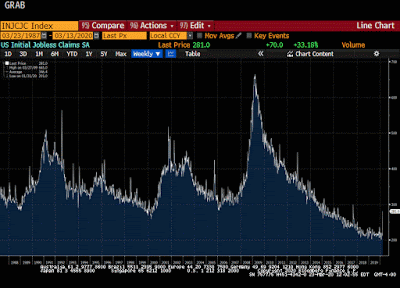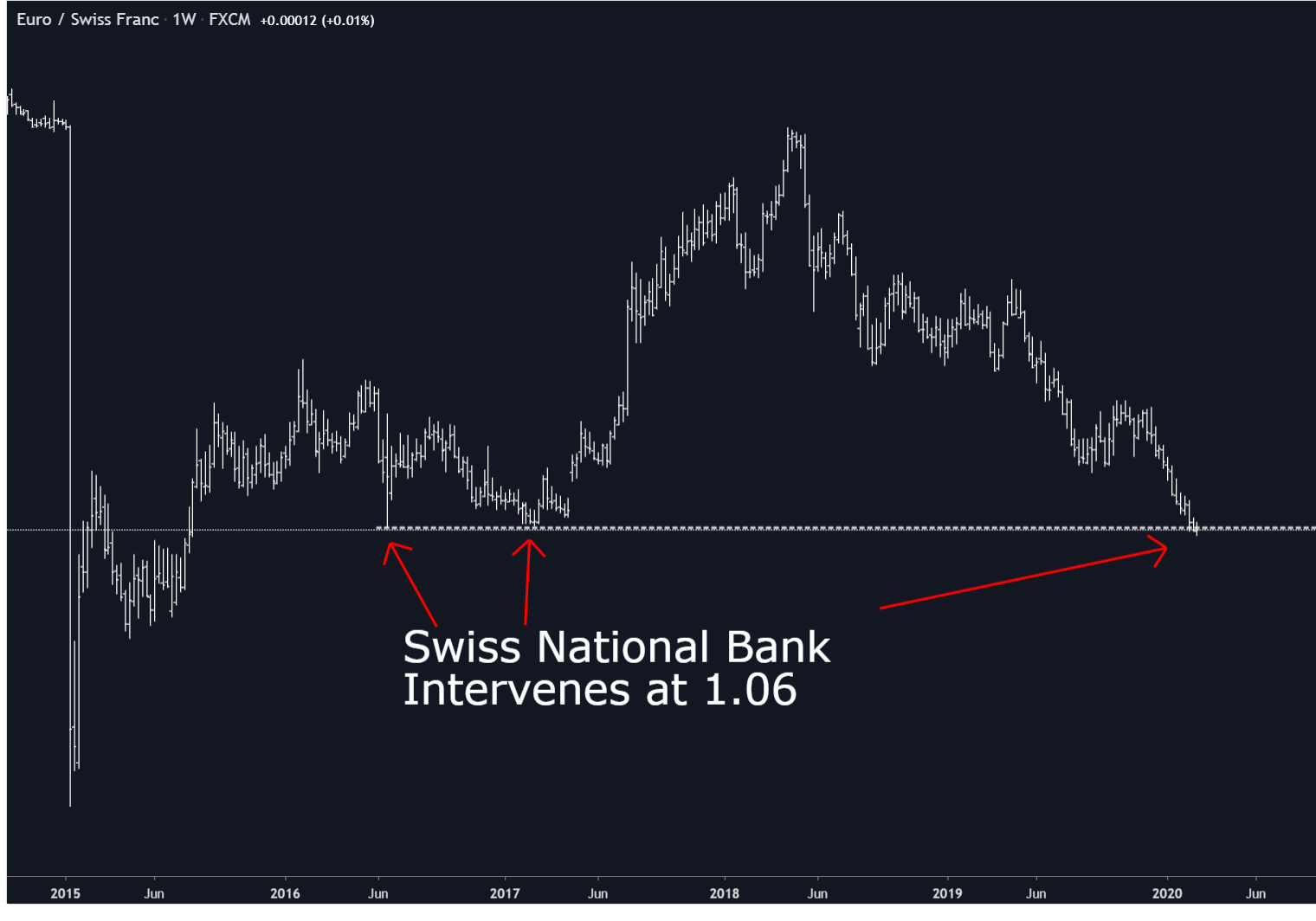Does anyone know what is happening? Economic data is likely to become increasingly unreliable as a result of the coronavirus lockdown. We know the global economy will be bad. We will not know, with much accuracy, just how bad. Annualizing data is absurd in the current climate. What happens in the second quarter is not going to be repeated for the rest of the year. Time to stop annualizing numbers. Most economic data is survey based. Industrial production, some unemployment numbers, inflation numbers, GDP and the various sentiment opinion polls need people to fill in surveys. If you are filling in survey forms in a lockdown you are likely to be an unusual person, and possibly not representative. Social media spreads fear and affects sentiment. Sentiment affects
Topics:
UBS Switzerland AG considers the following as important: 3.) Swiss Banks, Featured, newsletter
This could be interesting, too:
Nachrichten Ticker - www.finanzen.ch writes Die Performance der Kryptowährungen in KW 9: Das hat sich bei Bitcoin, Ether & Co. getan
Nachrichten Ticker - www.finanzen.ch writes Wer verbirgt sich hinter der Ethereum-Technologie?
Martin Hartmann writes Eine Analyse nach den Lehren von Milton Friedman
Marc Chandler writes March 2025 Monthly
 Does anyone know what is happening?
Does anyone know what is happening?
- Economic data is likely to become increasingly unreliable as a result of the coronavirus lockdown. We know the global economy will be bad. We will not know, with much accuracy, just how bad.
- Annualizing data is absurd in the current climate. What happens in the second quarter is not going to be repeated for the rest of the year. Time to stop annualizing numbers.
- Most economic data is survey based. Industrial production, some unemployment numbers, inflation numbers, GDP and the various sentiment opinion polls need people to fill in surveys. If you are filling in survey forms in a lockdown you are likely to be an unusual person, and possibly not representative.
- Social media spreads fear and affects sentiment. Sentiment affects answers to surveys. Data, like consumer price inflation, includes restaurant prices, but restaurants are closed. What happens when you survey something that is not there?
- Online spending is likely to have increased in lockdowns. Online spending may stay higher after the lockdowns end. It may not be properly captured in official data.
- Some data items are more reliable than others. Investors need to be careful about putting economic numbers into investment models, however. Garbage in means garbage out.
The global economy is going to have a very bad few months. Fear of the coronavirus has changed consumer behavior. Government policy aims to cut GDP growth in most major economies. But we may not really know what is actually going on in these economies. The quality of economic data is going to be affected by shutdowns. So where are the problems?
Annualizing
One problem is the US habit of “annualizing” its data. A few other economies also do this. This is never a great idea in normal times. It is an absurd thing to do now.
Annualization works by saying that what happens in one quarter will keep on happening, exactly the same way, for a year. Economic activity in the second quarter is going to be badly hit by shutdowns. No one imagines that this will be repeated for a whole year. US GDP might drop 7.5% in the second quarter. No sensible economist thinks that US GDP will drop 30% over the next year, but that is how annualization reports it.
The sensible approach is to ignore annualized numbers. Focusing on the quarterly changes is quite bad enough. There is no need to sensationalize the data.
Surveying a shutdown
Nearly all data is survey-based. That is obvious for things like sentiment opinion polls. But US unemployment is also a survey. The unemployment rate is categorized in the “household survey” part of the data. Across the world, industrial production is a survey. Retail sales numbers are surveys. Inflation data are surveys, normally weighted using the results of different surveys. GDP is a mass of surveys put together.
One of the reasons data quality has fallen in recent years is that fewer people fill in surveys. Those that do are less likely to answer all the questions. Surveys are a nuisance to do. In the age of email you can barely leave a shop or hotel without being asked to do a survey. People are fed up of answering questions.
In the current crisis, even fewer people are likely to want to fill in a survey. A business owner is not likely to want to answer detailed questions on retail sales in an economic lockdown. Anyone who does take the time to fill in a survey in the middle of this uncertainty is going to be “unusual”. Right now you probably do not want the opinion of anyone who wants to give you their opinion.
Businesses that are very busy (like food shops) will not answer government data surveys. Businesses that have shut down (like restaurants) will not answer government data surveys. There is a risk that data is based on a smaller and less representative sample of answers in an economic lockdown.
What if there isn’t anything to survey?
Measuring inflation is a problem in a shutdown. In the UK, restaurants and hotels are over 11% of the consumer price index. But restaurants are closed. What do you do about their prices? It seems pointless including the restaurant meals in consumer price inflation. People have stopped spending on various leisure activities and travel. (Unless people cancelled their subscription they will still spend on gym membership). If people are not spending, should the prices be counted?
In the United States medical care services are over 7% of the consumer price basket. A small sample of treatments are used to represent medical costs. But the medical care people used to pay for is no longer being bought. Medical care is focused on dealing with consequences of the coronavirus. So what is being paid for is now different. This will not be properly reflected in the prices.
Overall the demand shock of phase one should be disinflationary. It is unlikely to be measured properly. Producer prices may be more accurate than consumer prices. Producer prices are not affected by retail stores, or bars and restaurants closing. But some factories are closing (e.g. the auto sector). Gradually producer prices will also try to measure something that is not there.
Natural disasters, strikes and similar events sometimes mean that there is nothing to survey in part of an economy. However, this is often limited to a part of the country (for instance, US hurricanes). Alternatively only a relatively small sector is closed, as with as strike. Estimates can be made for the effect of the lost data. These estimates are often published alongside the numbers. The problem currently is that economies are shutting down nationally. Entire industries are closing. It is not going to be easy to adjust for that.
The rise of online
Economic lockdowns have increased online spending. People are shopping for the things that they need online. This is very evident in online food sales. People are also going online for gaming or films while stuck at home. This is a structural change in the way people consume. The move to online spending may continue after the lockdown. Once people start online spending, they may be more reluctant to go back to shopping in stores. However, economic data can be slow to recognize such structural breaks. Consumer spending may be under reported if the surge in importance of online spending is not properly captured. It is worth noting that consumption data generally registers the time of sale, not the time of delivery. The sale is recorded, even if there is a delay in the customer receiving their purchase.
Some larger firms are under pressure to close online sales. This is because large numbers of people work together to supply goods in large firms. For smaller firms this is less of a problem. But the fact that smaller firms may find online sales easier may also make such sales harder to capture in economic data. Some firms may also have problems finding supply. This will give an uneven change to online sales. That may also create problems with measurement. If the firms questioned are not representative of the whole sector, the data will not be correct.
There has been some evidence of under-reporting online activity in China. Online services are not generally reported in the economic data. There is also evidence that internet activity grew faster during the recent lockdown than officially reported online retail sales.
What can we look at?
What data can be relied upon in the lockdown period? As a general rule, data that avoids surveys or sentiment will be more reliable US initial jobless claims could be more reliable than US unemployment. Initial jobless claims require people to actually register. Many European unemployment numbers are based on people who file a claim. This will be reliable.
Data, like bank lending, should also be reliable. This has to be supplied for regulatory reasons, and is not done by a survey.
Investors are turning to data sources like electricity use to estimate what is happening to economies. This data needs to be used carefully. People working from home will still contribute to GDP, but electricity consumption will fall. Countries with a lot of manufacturing will tend to have larger drops in electricity use than countries that are more service sector focused, even if GDP falls equally in both places. Industries like steel use a lot of power relative to the amount of GDP they produce.
Similarly, measures of traffic or pollution in cities are only approximate measures of economic activity. Where people are able to work from home they will add to GDP without travelling. Again, the ability to work effectively from home will differ depending on what makes up an economy. A worker making cars will find it difficult to work from home. Economists often work from home.
The challenge
Investors will have to realize that we do not know what is going on during the worst phases of the coronavirus crisis. The quality of economic data is going to be lower. Whole sections of data cannot be captured properly. Data is likely to be revised a lot. The fashion for “big data” also needs to be treated with care. In a period of structural upheaval, economic relationships change.
The UK Office of National Statistics has already warned of reduced quality and reduced detail in some of its data. It has also highlighted the possibility of suspending some data publication.
For a few months, investors need to be very careful about using economic data in investment models. If the data is wrong, models will be wrong. Remember the computing adage—garbage in, garbage out.
Tags: Featured,newsletter








